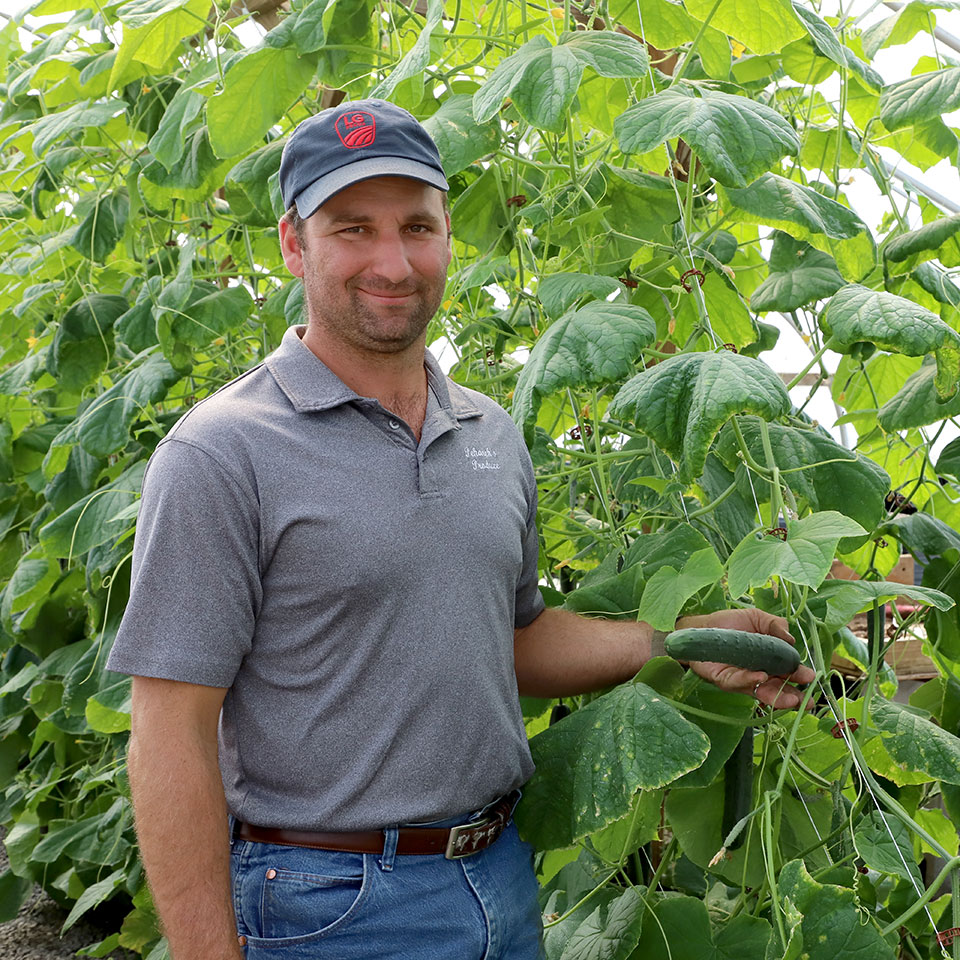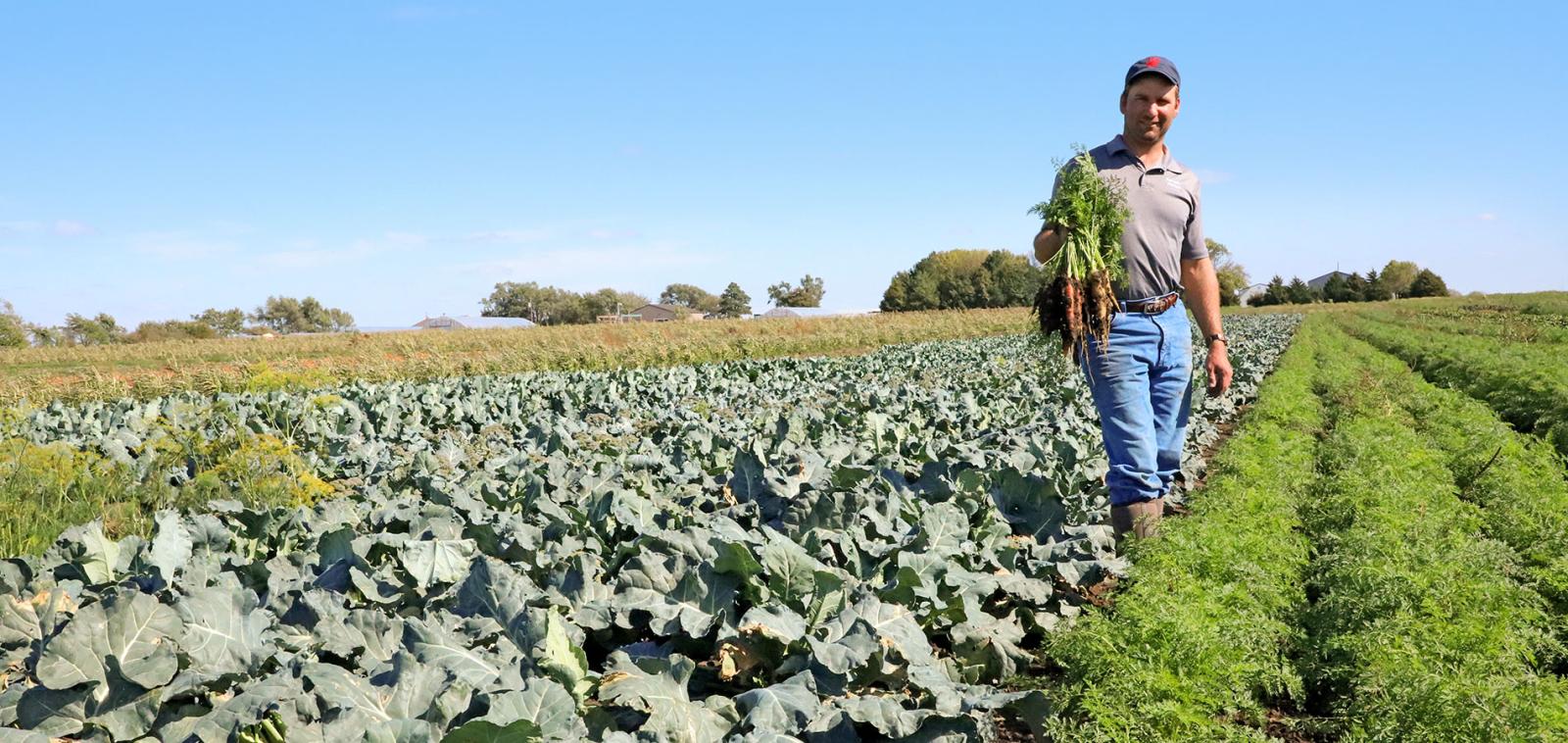
“You start this because you like farming, and then if you’re good at it, you do less and less as you get bigger and bigger. I get to farm on Sunday morning by myself, and then the rest of the week I’m managing people, making phone calls, or selling, going for parts, or fixing this or that.”
Not your average Nebraska farmer
In 2004, while yet an undergrad at the University of Nebraska–Lincoln, Ryan Pekarek started Pekarek’s Produce and planted his first crop on the family farm near Dwight. “At about one-half acre, it was really an overzealous home garden,” he said. Despite this early foray into farming, when Pekarek finished his bachelor’s degree in horticulture at Nebraska in the spring of 2006, he didn’t plan on being a farmer.
Ph.D. plans
Pekarek figured he’d probably end up with a Ph.D. at a university somewhere. To that end, Professor Emeritus of Horticulture Jay Fitzgerald, Pekarek’s adviser, encouraged him to get out of state and go see something else, as did Professor Emeritus Garald Horst. And so Pekarek and his wife Katie, who earned a degree in biological systems engineering from Nebraska, set out for graduate school at North Carolina State University.
Two years later, the Pekareks left Raleigh, North Carolina, with a pair of master’s degrees. Upon finishing his M.S. in weed control in vegetable crops, though, Pekarek was ready to be done with school. He knew he didn’t want to work in industry, and he realized that there could be a lot of politics involved with academic pursuits. “It was Ph.D. or posthole digger, and I picked posthole digger,” he said.
A big small farm
Pekarek, who began farming full-time with only vegetable crops in 2009, currently grows row crops (corn and soybeans) in addition to about 50 varieties of vegetables. Among vegetable farmers in Nebraska, he said, “We’re probably one of the smallest of the larger veg operations.”
During the 2017 planting season, Pekarek’s Produce had about 15 acres in vegetable production along with another quarter-acre under plastic (a greenhouse and five high tunnels). That’s a 2,950 percent increase from the first crop just 13 years ago! Not bad for a first-generation vegetable farmer in his 30s.
“You start this because you like farming, and then if you’re good at it, you do less and less as you get bigger and bigger. I get to farm on Sunday morning by myself, and then the rest of the week I’m managing people, making phone calls, or selling, going for parts, or fixing this or that,” Pekarek said.
Even while Pekarek acknowledged that he’s one of the biggest small vegetable growers in the state, he said his operation is absolutely small when compared to growers on the coasts. “Everybody that does this in Nebraska is small. Even the couple growers that are big are really tiny on the national scale. We’re all just different versions of small, whether we’ve got two acres or 200,” he said.
Out of the field and onto local tables
For Pekarek, who doesn’t have a background in business or marketing, the hard part of his operation is getting the produce into the hands of consumers. “It’s easy to grow this stuff; it’s hard to sell it,” he said. “Growing it is the easy, fun part. Getting it sold will turn your hair white.”
Since the beginning, farmers’ markets in Seward and Lincoln have provided a means to sell his colorful harvests to people who value the home-grown goodness of local produce. One such shopper, Professor Paul Read, under whom Pekarek did his honors thesis at Nebraska, said, “He is one of the most impressive vendors at various farmers’ markets, including the Haymarket Farmers’ Market.”
More recently, Pekarek’s Produce has generated income through community supported agriculture programs. Summer CSA subscribers prepay a flat fee in the early spring and then pick up boxes of farmer-selected produce for 18 weeks from June to early October. A fall CSA is also available for subscribers wanting to extend produce boxes into November and December.
In addition, Pekarek’s Produce does wholesale sales to grocery stores such as Super-Saver and HyVee and some restaurants in Omaha and Lincoln through Lone Tree Foods, which handles sales and transportation for 20 to 30 small farms. “If we cut something on Monday, it’s in the stores on Wednesday,” he said.
Partnering with the university
Pekarek continually works with faculty at the Department of Agronomy and Horticulture. For example, Pekarek’s Produce was the industry partner for the 2013–14 strawberry grant led by Professor Ellen Paparozzi, and Pekarek frequently makes his farm available for field trips and Sustainable Agriculture Research and Education tours. Pekarek also consults with Dave Lambe, associate professor of practice, and Stacy Adams, associate professor of practice, when he needs to figure something out, and he has been a guest speaker for a class taught by Assistant Professor Sam Wortman. While he chose not to seek a Ph.D., Pekarek is clearly doing much more than digging postholes.
By Chantel Koerwitz, contributor
